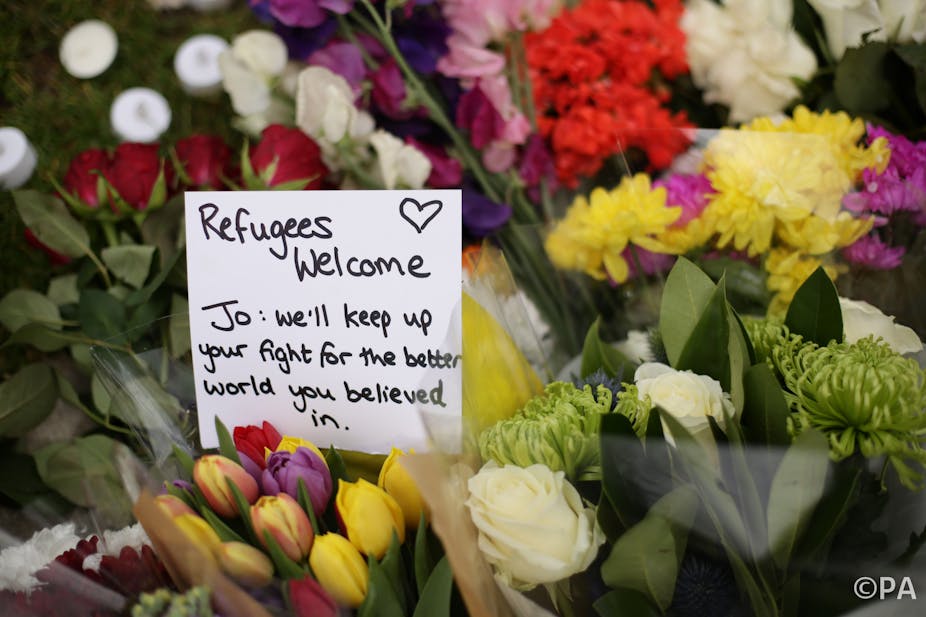The tone and volume of the Brexit debate had been growing steadily more shrill over the past few weeks as Britain got ever closer to its big, once-in-a-generation decision over membership of the EU. The campaign pitted erstwhile political allies against each other in parliament and on the hustings, while in pubs, clubs and family homes friendships and family ties have been sorely tested.
Press coverage of the campaign has been divisive and emotive. It’s been even more hostile on social media. And then, in the middle of this most bitter of political battles, the unthinkable.
We do not know why Jo Cox, the popular MP for Batley and Spen in West Yorkshire, was killed. But it has stopped a nation in its tracks. The campaigns were paused and, almost immediately, prominent voices were asking what had become of Britain in the preceding weeks.
“The mood is ugly, and an MP is dead” read the headline to a column by Polly Toynbee in The Guardian, highlighting “a chilling culture war” that had broken out in Britain and arguing the young MP’s killing “could not be viewed in isolation”. Alex Massie went further in The Spectator in a piece titled “A day of infamy”.
When you encourage rage you cannot then feign surprise when people become enraged. You cannot turn around and say, ‘Mate, you weren’t supposed to take it so seriously. It’s just a game, just a ploy, a strategy for winning votes.’ When you shout BREAKING POINT over and over again, you don’t get to be surprised when someone breaks. When you present politics as a matter of life and death, as a question of national survival, don’t be surprised if someone takes you at your word. You didn’t make them do it, no, but you didn’t do much to stop it either.
It is certainly true that some of the comments and posters from the campaign as well as some media headlines have thrown out of the window basic tenets of civil democratic debate: disagree with arguments, but do not attack the person making them, be truthful and do not distort evidence, be willing to listen to each other and accept that those holding opposing views may have good reasons for doing so.
Media circus
There are several reasons why the debate has turned so ugly. This was always going to be a heated campaign, such are the issues in play and the magnitude of a decision frequently portrayed as lasting and potentially irreversible.
Every message or claim communicated or refuted may appear vital as polls indicate a close race. And the news media – and in particular the written press with its clear alignments – have become increasingly partisan.

Given that most of written press has been anti-EU for decades, it’s not surprising that papers have made their editorial stance overt and entered full-blown campaigning mode. In the case of the Daily Mail, this has at times meant sacrificing traditional news values: the newspaper ignored the Orlando shooting on its front page in favour of an anti-EU story and, on Thursday it ran the headline: “As politicians squabble over border controls, yet another lorry load of migrants arriving in the UK declaring … We’re from Europe – let us in!”
Public slanging match
Much has been said of how increasing competitiveness drives the press to extremities. But competition of another sort has no doubt also spilled over to social media and online comments posted by members of the public. It is widely understood that anonymity makes people feel less restrained in what they say in forums and insults and threats are made online that would never be uttered face-to-face. In such settings, people seek reassurance from their own group – and social media allows people to exchange views with likeminded others, leading to positions becoming more extreme and assertive of their rightness.
In contrast to referendums about some other issues, the outcome of the vote on June 23 appears to matter greatly to voters, with the campaigns highlighting different aspects. In recent weeks as the polls have narrowed, campaigns focused more on risks of the opposing option, rather than the benefits of what to vote for.
The two sides suspended campaigning. But will the events that took place in Yorkshire a week before polling day change the debate or even the outcome of the referendum? This, we can’t know. One can only hope it will give an apparently divided country a strong narrative about the value of democratic institutions to resolve political conflicts calmly.
Perhaps equally, if not more important, than the referendum outcome is the question of how the nation can come together after the vote, especially if it is a narrow result. It will be crucial for everyone to find the right tone for a nation in shock and to support those who choose public service. The news media will have an important role in this and in the reconciliation that will be required – whatever the result may be.

